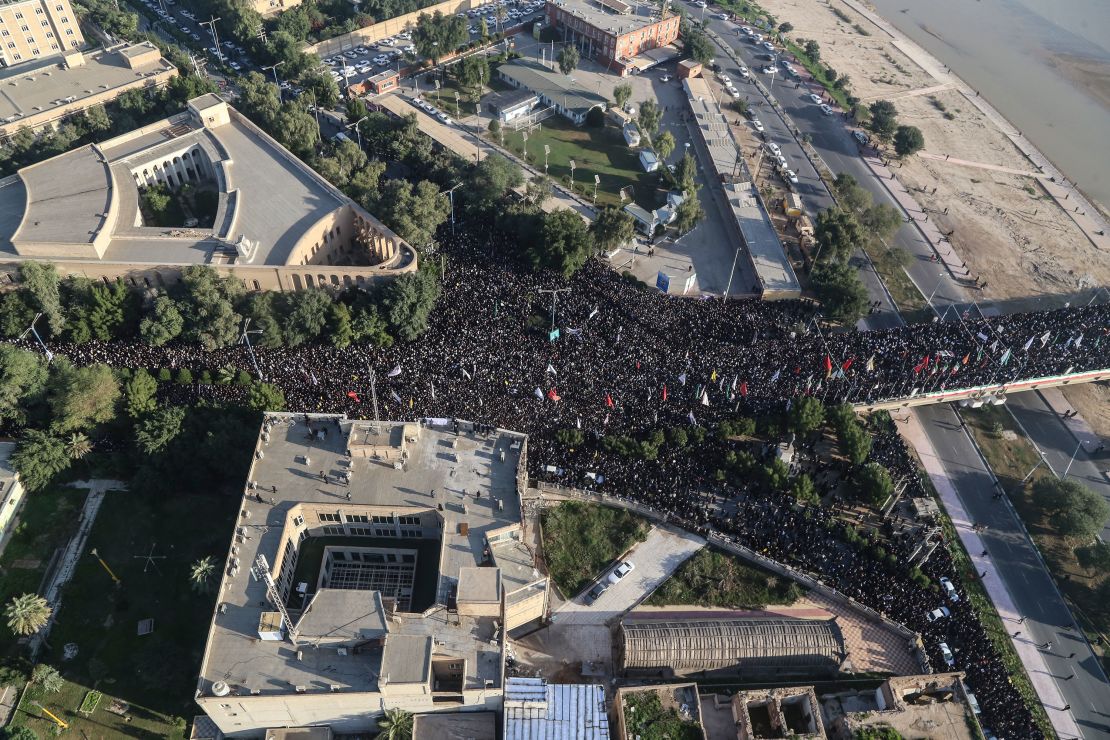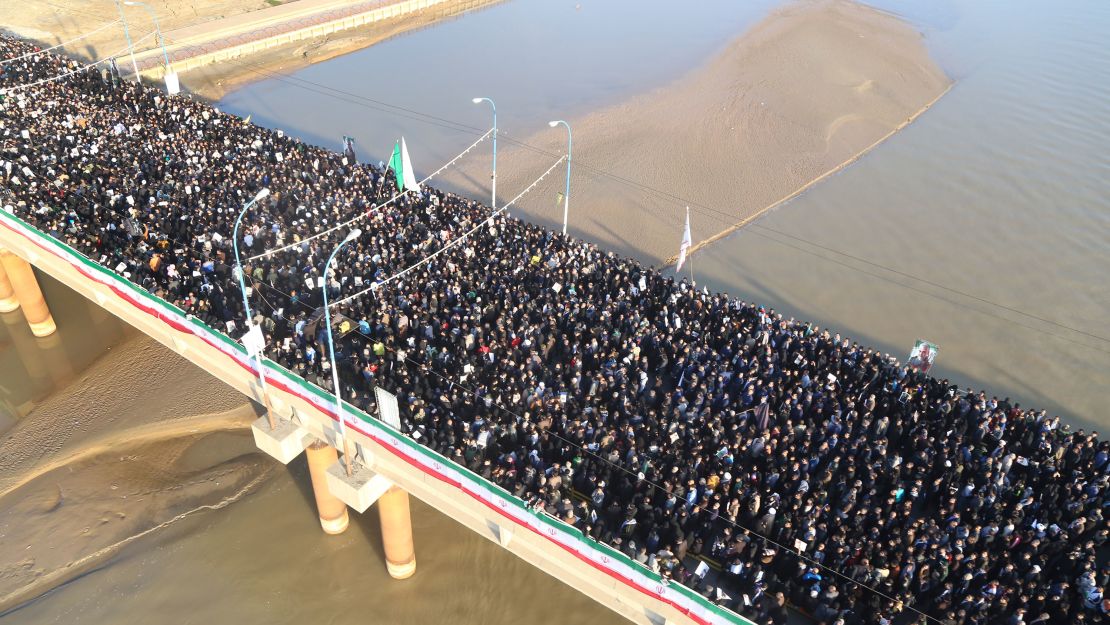The Iraqi Parliament voted Sunday to obligate Iraq’s government “to work towards ending the presence of all foreign troops on Iraqi soil,” according to the media office of the Iraqi Parliament.
The vote represents a rebuke of the United States over its targeted airstrike on Iranian commander Qasem Soleimani at Baghdad International Airport in Iraq early Friday. The attack has sharply escalated tensions with Iran and has pushed Iraq to reconsider the presence of American troops in the region.
Iraqi officials were preparing a memorandum for the withdrawal of foreign forces Sunday, Iraqi Prime Minister Adil Abdul Mahdi told French Foreign Minister Jean-Yves Le Drian in a phone conversation.
Muqtada al-Sadr, a leading Shia cleric and the head of Iraq’s largest political bloc, Saeroun, called the Iraqi Parliament’s vote Sunday a “weak response in comparison to American violations of Iraqi sovereignty.”He called for Parliament to terminate the security agreement with the United States immediately and to close the “evil American embassy” and all American bases immediately.
US officials tried to persuade Iraqi leaders to stop the parliamentary vote Sunday, according to two sources familiar with the discussions. Despite US officials claiming it would be harmful for Iraq to follow through on such a move and hold the vote at all, ultimately the argument fell flat. Axios was first to report this push by US officials.
“The mood in the country was pushing for it,” one source familiar with the discussions said of the vote. “This was not something that could have been avoided.”
The US was “disappointed” in Iraq’s actions Sunday, a US State Department spokeswoman said.
“We strongly urge Iraqi leaders to reconsider the importance of the ongoing economic and security relationship between the two countries and the continued presence of the Global Coalition to Defeat ISIS,” said spokeswoman Morgan Ortagus. “We believe it is in the shared interests of the United States and Iraq to continue fighting ISIS together.”
US State Department and National Security Council officials plan to meet with Iraqi officials Monday and Tuesday in Washington.
Adding to the rising tensions between the United States and Iran was an announcement Sunday by Iranian Foreign Minister Javad Zarif, who tweeted that Iranian cabinet members decided the country will no longer limit itself to the nuclear restrictions set forth by the Joint Comprehensive Plan of Action (JCPOA), the international nuclear deal reached in 2015 between Iran and a handful of other countries.
The body of Soleimani, a top general and one of the most powerful men in Iran, arrived in his home country on Sunday and was met by thousands of mourners who flooded the streets to honor him. His body and the bodies of his companions arrived in Tehran on Monday morning to massive crowds, according to Iran’s Press TV.
Mourners gathered in Iran’s western town of Ahvaz, where the bodies of Soleimani and Abu Mahdi al-Muhandis, an Iraqi militia leader also killed in the drone strikes, arrived earlier Sunday.

A funeral service for Soleimani was expected to take place later Sunday in Mashhad, at the holy site of Imam Reza Shrine. But a scheduled ceremony slated to take place at Tehran’s Grand Mosalla on Sunday night was canceled because of the delayed procession caused by the large turnout of mourners in Mashhad, according to the Islamic Revolutionary Guard Corps (IRGC).

Iran will observe three days of national mourning, paying respects to Soleimani, who was seen as a national hero and has been called a martyr by the Iranian leadership.
President Trump and US military officials have said they killed Soleimani because he was planning an “imminent” threat on Americans. But the lack of evidence provided to lawmakers or the public on that point has fueled lingering skepticism about whether the strike was justified.
He said that if Iran strikes any Americans or American assets, the US has targeted 52 Iranian sites – a reference to the number of Americans taken hostage in the 1979 revolution – “some at a very high level & important to Iran & the Iranian culture,” he wrote.
“They attacked us, & we hit back. If they attack again, which I would strongly advise them not to do, we will hit them harder than they have ever been hit before!” Trump wrote.
Trump reiterated those threats Sunday while flying from Florida to Washington on Air Force One.
“They’re allowed to kill our people, they’re allowed to torture and maim our people, they’re allowed to use roadside bombs and blow up our people, and we’re not allowed to touch their cultural site? It doesn’t work that way,” Trump said, according to a pool report.
Trump also threatened sanctions against Iraq should US troops be expelled from the country.
In a joint statement Sunday, French President Emmanuel Macron, German Chancellor Angela Merkel and British Prime Minister Boris Johnson called on all parties to “exercise utmost restraint,” saying there is “an urgent need for de-escalation” concerning rising tensions with Iran.
“We specifically call on Iran to refrain from further violent action or proliferation, and urge Iran to reverse all measures inconsistent with the JCPOA,” the statement read. “We recall our attachment to the sovereignty and security of Iraq. Another crisis risks jeopardizing years of efforts to stabilize Iraq.”
Iran slams threats to cultural sites
Attacking cultural sites is considered to be a war crime. A 2017 United Nations Security Council Resolution “condemns the unlawful destruction of cultural heritage, including the destruction of religious sites and artifacts.”
Secretary of State Mike Pompeo defended Trump’s tweet, arguing that such an action would not violate international law and instead suggesting it would be a continuation of the administration’s attempts at deterrence and defense.
“If we need to defend American interests, we will do so. What President Trump said last night is consistent with what we have said all along,” Pompeo told CNN’s Jake Tapper on “State of the Union.”
The tweets are “ridiculous and absurd,” said Hossein Dehghan, the main military adviser to Iran’s Supreme Leader Ayatollah Khamenei. He told CNN that Iran’s response “will be military and against military sites.”
“Let me tell you one thing: Our leadership has officially announced that we have never been seeking war and we will not be seeking war,” Dehghan said.
“It was America that has started the war. Therefore, they should accept appropriate reactions to their actions. The only thing that can end this period of war is for the Americans to receive a blow that is equal to the blow they have inflicted. Afterward they should not seek a new cycle.”
If the US does carry out Trump’s threat to strike any of Iran’s cultural sites, then “for sure no American military staff, no American political center, no American military base, no American vessel will be safe,” Dehghan said. “If he says 52, we say 300, and they are accessible to us.”
Skepticism over ‘imminent’ threat

Pompeo dodged questions asking to detail the “imminent” attack that Soleimani was allegedly planning and whether it was expected in days or weeks.
“If you’re an American in the region, days and weeks, this is not something that’s relevant,” Pompeo said.
“We have to prepare, we have to be ready, and we took a bad guy off the battlefield. We made the right decision. There is less risk today to American forces in the region as a result of that tack,” he said.
Pompeo said he understood the public’s need to know but had to balance that with protecting the sources and methods of that intelligence.
“We’ll continue to do everything we can consistent with protecting our sources and our methods and our importantly our capacity to continue to see and to understand what’s going on and presenting threats,” he said.
“As the Secretary of State I also know my solemn obligation to make sure we share with the American people everything we can about why it is we’re taking the actions, and how it is we expect that we will deliver to protect and defend America each and every day.”
The Pentagon had blamed Soleimani and Iran-backed Iraqi militias for recent assaults on coalition bases in Iraq, including a December 27 strike that killed an American civilian contractor and wounded several US and Iraqi military personnel.
After retaliatory US airstrikes against the militias last month, hundreds of protesters stormed the US Embassy compound in Baghdad on December 31, an attack the US blamed on Soleimani.
Soleimani was the head of Quds Force, an Islamic Revolutionary Guard Corps unit in charge of foreign operations, and he became the architect of Tehran’s proxy conflicts in the Middle East. The Pentagon blamed Soleimani for hundreds of deaths of Americans and their allies over the years.
Iraqi Parliament debates future of US troops
The US military strike against Soleimani in Baghdad and has thrust the future of the US presence in Iraq into question.
The Iraqi Parliament called an extraordinary session on Sunday to decide the future of US troops in Iraq and voted to obligate the Iraqi government to work to end the presence of all foreign troops.
On Saturday, mourners in Iraq chanted “Death to America” at a funeral procession for Soleimani and the Iraqi militia leader who died with him.
In addition, Iraq’s Foreign Ministry filed a complaint via two letters to the President of the UN Security Council and UN Secretary General about the “American attacks and assaults against Iraqi military locations,” according to a Foreign Ministry Statement.
The complaint was also about the death of al-Muhandis, the militia leader, and others on Iraqi soil.
“These attacks represent a serious violation of Iraqi sovereignty and the conditions of the presence of the American forces in Iraq,” the statement read, adding, “Iraq called on the Security Council to condemn the bombing and assassinations.”
Iranian Foreign Minister Javad Zarif seemed to suggest the goal of any Iranian retaliation, tweeting Saturday: “End of US malign presence in West Asia has begun.”
CNN’s Artemis Moshtaghian, Mohammed Tawfeeq, Jomana Karadsheh, Ingrid Formanek, Jennifer Hansler, Dylan Wells and Hira Humayun contributed to this report.



















